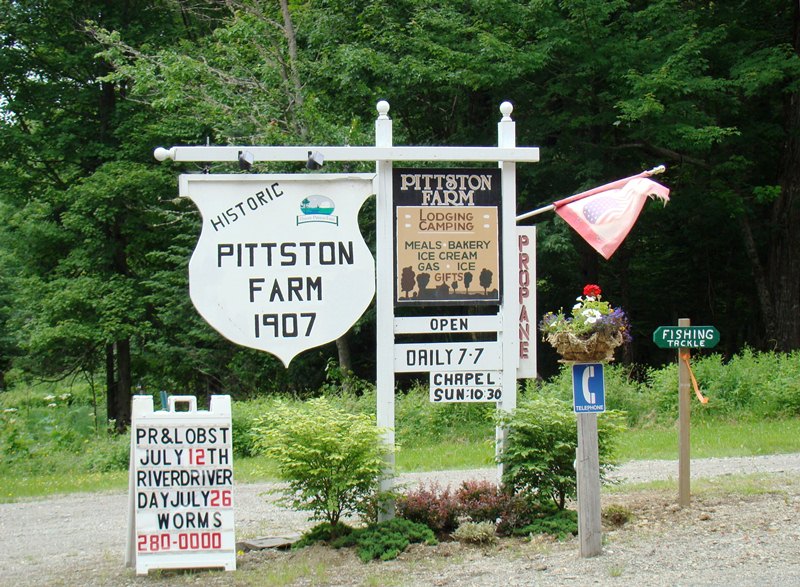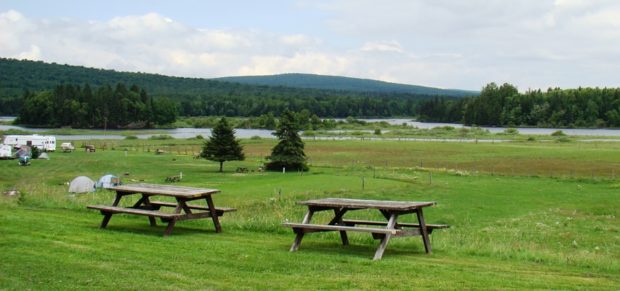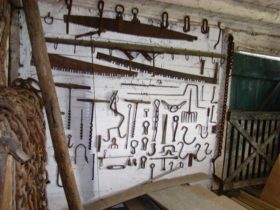This township is mostly south of the Golden Road where the Northern Road turns down toward the Pittston Farm, established by the Great Northern Paper Company.
According to John Gould,
In lumber camp lingo a “farm” is a depot and base of operations serving a considerable area of working timberland. Pittston Farm had storage sheds, garages, hay barns and horse stables, sleeping and eating quarters, office space, and [a] telephone exchange . . . .
The Farm, which includes a museum and public dining facilities, is on the North Branch of the Penobscot River as it enters Seboomook Lake at its western end.
The South Branch of the Penobscot River flows through Canada Falls Lake, then to the Lake as well. At the eastern end of the Lake, the river, as it exits, is renamed as the West Branch of the Penobscot.
A State of Maine public boat launch is near the farm on Seboomook Lake.
As one travels south on the Northern Road, a Maine Forest Service station is located near the Farm. Not far further south is one of several checkpoints on the North Woods private roads. This one, the 20-mile Checkpoint, regulates vehicular traffic in the area.
More Videos!
Additional resources
Ferland, Durward J. Yesterday, Today, Tomorrow: A History of Pittston Farm. Greenville, Me. Moosehead Communications. c1995.
*United States Department of the Interior. National Parks Service. “Pittston Farm.” https://npgallery.nps.gov/pdfhost/docs/NRHP/Text/00000762.pdf
Gould, John. Maine’s Golden Road. New York. W. W. Norton. 1995. p. 12.
National Register of Historic Places – Listings
Pittston Farm
Deep in Maine’s north woods, Pittston Farm was developed by Great Northern Paper Company in the early 20th century to support its logging operations. The farm was designed to produce and store food for the logging crews and their horses, to provide accommodations, medical facilities, and recreation, and to function as a center of communications. Facilities like the Farm were essential as paper companies extended their logging activities farther into the woods away from settled areas. Pittston Farm is believed to be the most intact of the several depots established by Great Northern.
Pittston Farm originated as a stopping place for sportsmen going to Canada via the old Indian trail. Sometime between 1850 and 1879, a Mr. Knight cleared 10 acres at the intersection of the North and South Branches of the West Branch of the Penobscot River. At his farm hunters and fishermen could buy supplies such as chickens, eggs, and dressed lamb. It passed through several owners during the late 19th century. Around 1900, C. J. McLeod of Bangor leased the farm and ran it while logging the North Branch, adding six or seven log camps on 20 cleared acres. Charlie Jackson took over running the farm and lumbering the area around 1904.
Great Northern Paper Company purchased the entire township of Pittston Academy Grant, including Pittston Farm, in 1906 and large paper company operations started. In 1908 the company began building what is now the present farm 500 yards west of the log buildings. The improvements continued until about 1914, and the cleared area had been increased from 20 acres to 100 acres. During its use by Great Northern, Pittston Farm was one of twelve known depots that the company developed for its logging operations in Maine.* [See the video above.]




